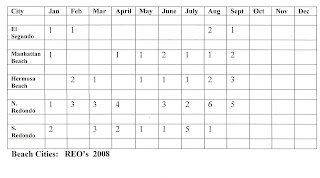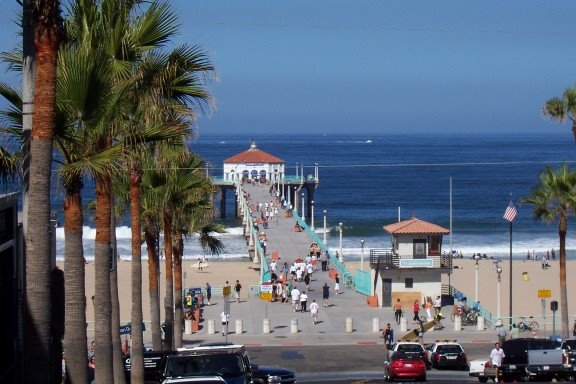
Trying to keep up with the economy and Wall street is like trying to beat Tiger Woods when he's 1 stroke down on the last 17th hole... a whole lot harder then it looks. Consumers are caught in the middle as they watch the stock market and the value of their portfolios move up and down like a yo yo while media headlines talk about recession and unemployment. Pundits tell us that lenders are not making loans amid predictions of more foreclosures while the same headlines also tell of increased sales because of the foreclosures. It seems the economy changes day to day and sometimes hour to hour.
Real estate prices in the South Bay Beach Cities have always been a major topic of conversation and more so now given the current economic climate. Buyers want to know when prices will drop 50% and sellers want to know when they will move back up. Reality is somewhere in between. Our little slice of paradise is still not seeing huge numbers of foreclosures nor massive declines in value... but that could change if the South Bay economy begins to see job losses along with increased foreclosure activity.
So far the Beach Cities have managed to hold up better then other parts of California when it comes to real estate values. But that doesn't mean we are not seeing an increase in foreclosures and short sales along with lower prices. Prices have dropped in Manhattan Beach, Hermosa Beach, Redondo Beach and El Segundo. In the current economic climate we will see prices soften a bit more. Much will depend on how badly the South Bay economy is hit by the economic problems that are being seen in much of the state.
Foreclosure is a process that begins when homeowners find themselves unable to make their mortgage payment and ends when the owner either makes up the back payments or the home is sold at auction. An important item to remember is that throughout the course of events a homeowner can redeem their property and stop the process by paying the past due amount and any penalties involved.
The process usually takes around 6 months or longer and involves a number of steps before the bank or someone else winds up owning the property. A new law in California requires that a lender must notify a homeowner at least 30 days before sending out a default notice. In the normal course of events about 15% of homes that receive a NOD actually go through the entire process of foreclosure. However in today's economic climate we can expect a higher percentage ... closer to 50%... to become REO property. In the normal course of events it takes a minimum of 3 months of no payments before a NOD (notice of default) is issued by a lender to the homeowner. If the homeowner doesn't contact the lender and try to work out an arrangement with the lender to halt the process or make up the back payments the lender will issue an NOT (notice of trustee sale) which is a notice to the owner that if the payments are not brought current then the property will be sold at auction to the highest bidder... which usually winds up being the bank. At this point if the owner has not worked out an arrangement with bank, found a way to redeem the property or an outside bidder doesn't get the property; the bank becomes the owner of the property and it is officially an REO (real estate owned) property.
So how are we doing in the Beach Cities? Let's see...... The information** below is for the period January 1, 2008 to September 2008. (click on the graph to enlarge)
South Bay-Beach Cities: NOD's Jan - Sept. 2008

South Bay-Beach Cities: NOT's Jan - Sept. 2008

South Bay-Beach Cities: REO's Jan - Sept 2008

Myths and rumors about foreclosures:
Lenders are stockpiling foreclosed homes so the public won't know how bad things are....
Banks may be greedy but they are not entirely stupid...By Federal law lenders can not hold a property longer then one year on their books or it costs them huge amounts of cash that must be held in reserve against the property. The problem for most banks is that they don't really know how to handle foreclosures and it simply takes a long time for them to get the properties to market. It would make no sense to hold property off the market and then flood the market with huge numbers of foreclosures.
**I will begin updating foreclosure information on a monthly basis for the Beach Cities. The information is from Southland Title and is based on recorded information for all types of properties(homes, townhomes/condos and residential income properties).
The main photo above is courtesy Jeff Turner. Jeff's company Real Estate Shows is the program I use for my videos. Thanks Jeff!





No comments:
Post a Comment